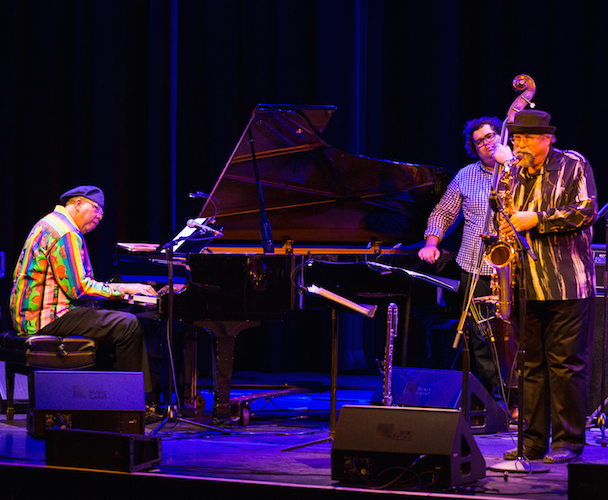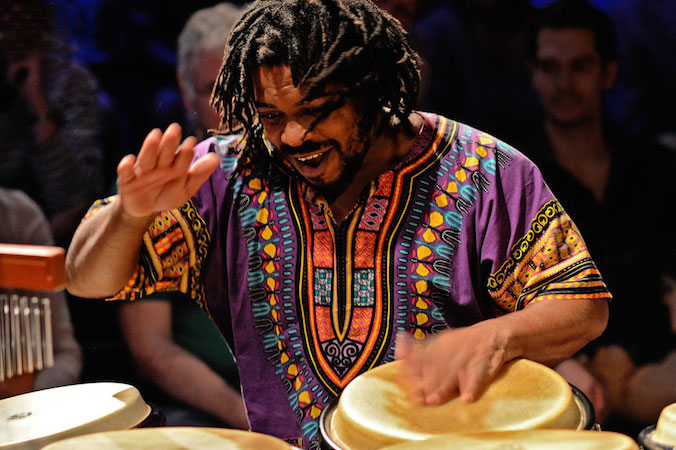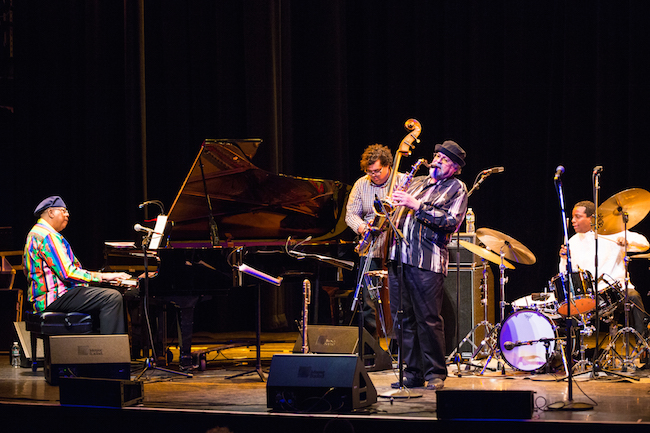Jazz Review: Chucho Valdés – Joe Lovano Quintet at the Berklee Performance Center — Molto Vivo
Intense head music and powerful foot music, but this show needed a little more heart.

Cuban pianist Chucho Valdés, bassist Gaston Joya Perellada, and saxophonist Joe Lovano at the Berklee Performance Center. Photo: Robert Torres.
By Steve Elman
[Disclosures: I received press tickets to this event from the Celebrity Series. I’m indebted to Stephanie Janes for providing information about the set list, and to David Adler of allaboutjazz.com for identifying the chord changes of Lovano’s “Charlie Chan.”]
As I listened to Berklee alumnus / professor Joe Lovano and Cuban pianist Chucho Valdés at the Performance Center on Sunday November 6, I kept thinking of other sax-piano summits – John Coltrane’s stint in Thelonious Monk’s band, Charlie Parker’s recordings with Erroll Garner, even Ben Webster’s one-shot with Art Tatum. When mature artists decide to collaborate, the matter of leadership has to be clearly understood by both of them, even when the leadership role shifts from moment to moment. And even when a basic understanding has been established, it often takes a lot of work to realize the potential in the team. Valdés and Lovano still have some work to do in this new band, but its promise is enormous.
Both of the co-leaders are fully mature artists, which makes the partnership particularly provocative. Pianist Valdés holds stature in his home country not only as a virtuoso but as a cultural icon. He inherited the mantle of his father Bebo, a treasure of traditional Cuban music, and has transcended Bebo’s greatness, establishing a new standard in keyboard technique and combining it with an understanding of harmony that is as great as or greater than that of any jazz musician working today. At the same time, he has maintained his grounding in Cuban tradition, as demonstrated by the Berklee concert program, which included examples of mambo, son, and bolero (in a classic Cuban popular song), all of them profoundly transformed, of course. Valdés is also steeped in the conventions of Latin piano that non-Latin pianists have to struggle mightily to master – not just the brilliant staccato block chords that are a signature gesture of the music, but the skill of relaxation at the most furious tempos, a subtle behind-the-beat approach that’s as cool as Valdés’s countenance, which remains placid even as his fingers fly.
Joe Lovano is eleven years Chucho Valdés’s junior. He is now an A-list saxophone star, with more Blue Note albums released under his own name than any other artist in the label’s history. Since making his professional debut in Boston’s neighborhood jazz clubs in the 1970s, he has proven everything he needs to prove as an artist – stunning ability on his horn, deep knowledge of harmony, profound familiarity with all aspects of the jazz tradition, and a restless curiosity about new forms and contexts. He’s also a sophisticated composer, not just a crafter of tunes.
By personnel alone, the quintet is a Valdés group with Lovano as guest artist, although Lovano has had a lot of impact on its repertoire. The support is impeccable, with top-class Cuban credentials. Master percussionist Yaroldy Abreu Robles and virtuoso bassist Gaston Joya Perellada have played with Valdés’s Afro-Cuban Messengers and know his music intimately. Drummer Francisco Mela, who has worked with McCoy Tyner and recorded with his own groups, joined Valdés in October as this quintet was working out its kinks.
At this point in the group’s development, it seems to me that Lovano is (appropriately) deferring to Valdés, much as Coltrane deferred to Monk. Also, Lovano is by his very nature a collaborator, seeking out opportunities to exchange ideas and make mutual music rather than dominate an ensemble by force of will, which is why his catalog of recordings is so varied and interesting. In this group, which admittedly is only a few months old, I miss of the some emotional depth he’s shown in other contexts – the warmth and soul that he openly credits to his Sicilian roots.

Yaroldy Abreu Robles. His percussion spots consistently threatened to steal the show. Photo: Gerhard Richter,
Valdés and Lovano have much in common as thinkers and as players, and the Celebrity Series is to be applauded for recognizing how much potential they have as collaborators and booking them at the start of their joint venture. As I noted above, they are both very sophisticated harmonic improvisers. When soloing, each strives to expand the emotional range of a tune by modifying its chords, piling on dissonances, layering key upon key, and flying into polytonality or outright free-form as his inspiration demands. And each has the monstrous technique to achieve those very ambitious goals.
Because of his instrument’s limitations, Lovano’s approach must be more linear than Valdés’s, and this puts him at something of a disadvantage. For every single note (even with the occasional high-register split-tone) that Lovano can play on his saxophone, Valdés can and does play five to ten on the piano, with every variation that fully independent manual ability allows, from locked-hands chords to counterpoint to what sounds like two pianists competing with each other. But the saxophone has a human voice, a capacity to smear and cry and coo and, as an emotional tool, the tenor sax especially has a vocal power which can equalize any contest with a piano. In this particular concert, Lovano showed that he could match Valdés note for note, but he held back on that full-throated emotion he can get from his horn at slower tempos.
Perhaps the programming contributed to my impression. The first tune, Lovano’s “The Dawn of Time,” is a complicated line without a fixed tonal center. He’s recorded it at least twice, and the version on his CD Symphonica (Blue Note, 2008), with the WDR Radio Orchestra, gives it a rich large-ensemble realization. When those harmonies are stripped down for a small group setting, something suffers. Lovano and Valdés each delivered fiery, heavily-arpeggiated solos on the tune, but this quickly became intense head music, and it presented a challenge to listeners right out of the gate.
The second tune, also a Lovano original, was “Charlie Chan,” a contrafact of Miles Davis’s “Milestones,” named for one of Charlie Parker’s recording pseudonyms. It was originally recorded on Lovano’s 52nd Street Themes (Blue Note, 2000), and as you might expect, it’s cut from classic bebop cloth. That original has a good-natured drive, like so many neo-bebop heads, but this band Cubanized it, which may have confused its identity somewhat. Lovano and Valdés again took an aggressive approach in their solos, pulling the harmonies this way and that. More head music, but plenty of powerful foot music too.
Because each of these tunes had substantial bass solos as well, with Joya Perellada in the same spirit as the leaders, almost a half-hour of the concert passed without a release from the musical tension. That came in Valdés’s “Nanú Dionisio,” a folkier theme, still in a bright tempo, which prompted well-shaped solos from both principals. But two more driving Valdés tunes followed, “Mambo Influenciado” and “Son de Almendras,” with Lovano playing alto flute as well as saxophone on the second. Despite a cheery cha-cha-cha section in the son, the heat of the solos and the density of the improvisations never let up.

Cuban pianist Chucho Valdés, bassist Gaston Joya Perellada, percussionist Francisco Mela, and saxophonist Joe Lovano at the Berklee Performance Center.Photo: Robert Torres.
The first real moment of calm finally arrived in a beautiful version of Thelonious Monk’s “Monk’s Mood.” Lovano and Valdés both have profound respect for Monk, which was obvious from the way they adapted the tune without violating its spirit. Then they cleverly segued into “Eternity,” a Lovano original that draws on the see-saw pattern of Monk’s “Misterioso.”
Finally, well into the second hour of the concert, we were treated to a true ballad in the classic style, McCoy Tyner’s “You Taught My Heart to Sing,” where Lovano realized the promise of the title and sang from his heart through his horn.
The program proper ended with a jagged long-form rearrangement of Miles Davis’s “Solar,” again at a hot tempo, which gave each member of the group a chance to stretch out. The encore brought back the ballad mood with Osvaldo Farrés’s Cuban classic, “Tres Palabras,” very soulfully played.
Ten tunes in two hours – that’s an average of more than ten minutes per. Valdés and Lovano certainly don’t need my advice, but if I had been asked, I would have rearranged the program, with a more melodic lead-off and a real ballad in third position. I also would have abbreviated two of the originals, turning each of them into solo features for its composer. That might have made room for an element that seemed missing to me – a true groove tune at a medium tempo, say Dizzy Gillespie’s “Tin Tin Deo.”
What fun it is to fantasize! With musicians of this caliber, I could imagine them playing almost anything, and I’d never doubt their ability to surpass my expectations.
More:
Set list for Celebrity Series concert by Chucho Valdés – Joe Lovano Quintet, November 6, Berklee Performance Center, Boston
1. The Dawn of Time (Joe Lovano)
2. Charlie Chan (Lovano)
3. Nanú Dionisio (Chucho Valdés)
4. Mambo Influenciado (Valdés)
5. Son de Almendras (Valdés)
6. Monk´s Mood (Thelonious Monk)
7. Eternity (Lovano)
8. You Taught My Heart to Sing (McCoy Tyner)
9. Solar (Miles Davis)
10. Encore: Tres Palabras [Three Words] (Osvaldo Farrés)
Upcoming tour dates for the Chucho Valdés – Joe Lovano Quintet:
November 12: Sheldon Concert Hall, St. Louis, MO
November 13: Rialto Theatre, Atlanta, GA
November 15: Musical Instrument Museum (MIM Music Theatre), Phoenix, AZ
November 17 – 20: SFJAZZ Center (Miner Auditorium), San Francisco, CA
November 22 – 27: Birdland, NYC
Joe Lovano will return to our area on March 2 next year, playing at the Regattabar in Cambridge with trumpeter Dave Douglas, pianist Lawrence Fields, bassist Linda Oh, and drummer Joey Baron.
The Celebrity Series continues its commitment to top-flight jazz programming through the rest of the current season. Of particular note for jazzpeople next year:
• Violinist Regina Carter will memorialize Ella Fitzgerald in a performance at Sanders Theater on February 1.
• Saxophonist Chris Potter will lead an all-star quartet (with guitarist Kevin Eubanks, bassist Dave Holland, and drummer Obed Calvaire) at Sanders on May 6.
• Wynton Marsalis and the Jazz at Lincoln Center Orchestra, featuring drummer Ali Jackson, will celebrate the legacy of Buddy Rich at Symphony Hall on April 9.
• Pianist-composer Vijay Iyer will perform with his sextet at Sanders Theater on March 9.
Steve Elman’s four decades (and counting) in New England public radio have included ten years as a jazz host in the 1970s, five years as a classical host in the 1980s, a short stint as senior producer of an arts magazine, thirteen years as assistant general manager of WBUR, and currently, on-call status as fill-in classical host on 99.5 WCRB since 2011. He was jazz and popular music editor of The Schwann Record and Tape Guides from 1973 to 1978 and wrote free-lance music and travel pieces for The Boston Globe and The Boston Phoenix from 1988 through 1991.
Tagged: Celebrity-Series, Chucho Valdés, Gaston Joya Perellada
